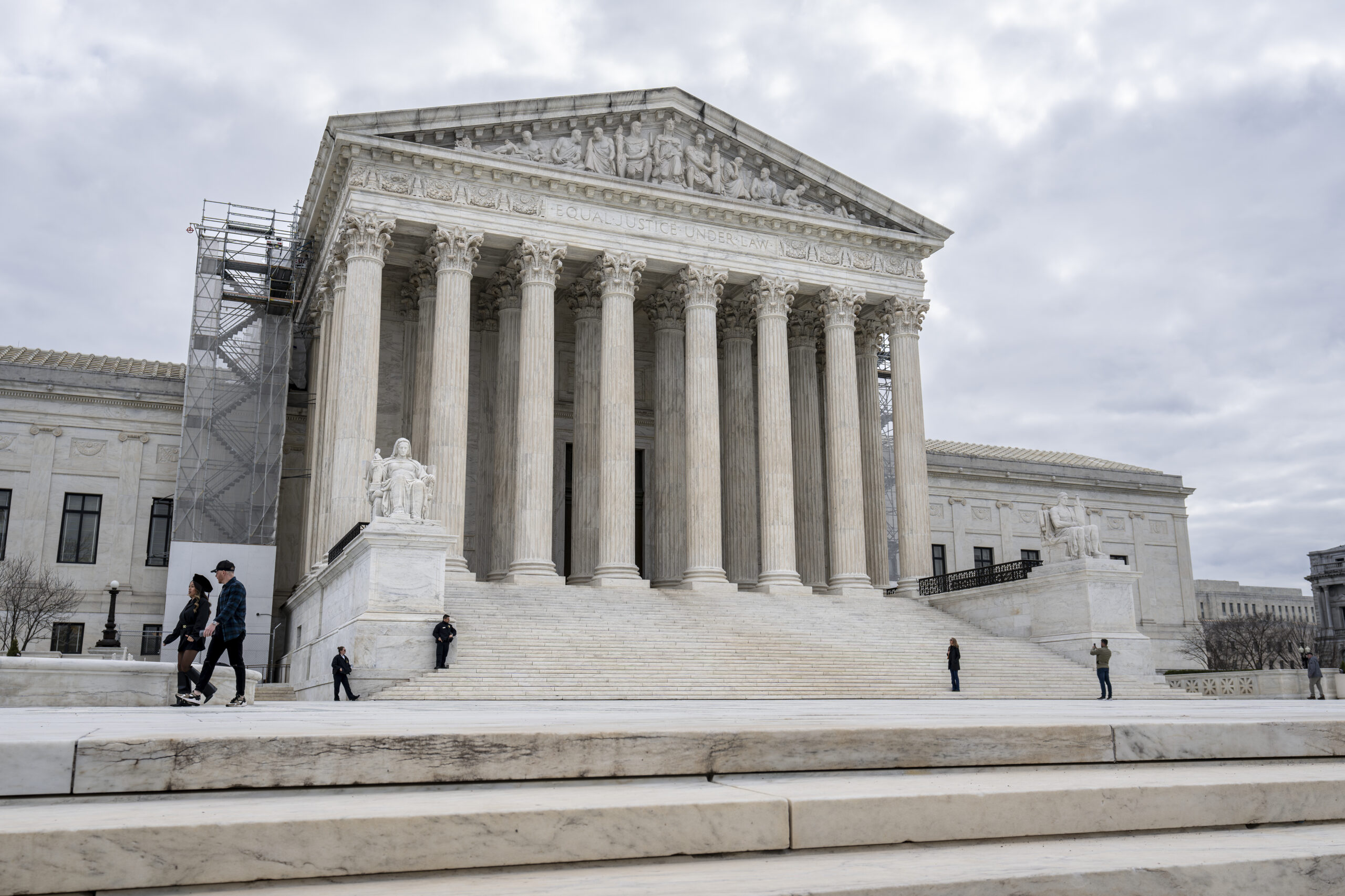

The Supreme Court is considering a lawsuit meant to reverse the Food and Drug Administration’s approval of the abortion pill mifepristone. The case has major ramifications for abortion access, given that a majority of abortions are now performed via medication. It also could reshape the 2024 elections, in which abortion is expected to be a significant consideration for voters. The Washington Examiner is featuring a series of articles providing an in-depth look at the case and its implications. This first entry lays out the basic facts that the Supreme Court will consider.
The Supreme Court on Tuesday is slated to hear oral arguments regarding the Food and Drug Administration’s approval of the abortion pill mifepristone, the ruling on the case having a significant bearing on abortion access heading into the 2024 election.
The legal fight against mifepristone started in November 2023, when a group of religious doctors who oppose chemical abortions, known as the Alliance for Hippocratic Medicine, sued to reverse the FDA’s 2000 approval of the drug.
U.S. Judge Matthew Kacsmaryk, a Trump appointee in the Northern District of Texas, made an unprecedented ruling in April last year to completely suspend the FDA’s approval of the pill, the first time a court has suspended a medication’s approval after rejecting the assessment of a human drug by the FDA.
A three-judge panel on the U.S. Court of Appeals for the 5th issued a ruling agreeing with Kacsmaryk in part, a decision that still sharply curtailed access to the drug.
That decision — if allowed by the Supreme Court to take effect — would pare back actions the FDA has taken since 2016 to make the pills more accessible, including regulations on allowing mail delivery, pharmacy dispensing, and online ordering of the drug. Danco Laboratories, the makers of mifepristone, is arguing alongside the FDA to keep these accessibility changes in place.
Here are the key details to know before Tuesday’s argument.
1. The case is about how the FDA reviews safety and efficacy standards, not directly abortion access
The primary issue of the case is whether the FDA met its obligation to “examine the relevant data and articulate a satisfactory explanation for its action” under the Administrative Procedures Act in 2016 and in 2021 when it loosened restrictions on mifepristone.
Jim Campbell, chief legal counsel for the conservative legal group Alliance Defending Freedom, told the Washington Examiner that their case solely relies upon the data used by the FDA to substantiate the loosened restrictions.
Campbell told the Washington Examiner that the FDA relied upon self-reported adverse consequence data to determine that it would be safe to remove the requirement for a patient to visit a physician in person before taking mifepristone. The FDA, however, has emphasized that data through the FDA Adverse Event Reporting System, or FAERS, is insufficient in making decisions regarding efficacy.
The FDA also relied on scientific studies that found removing in-person visits was not “inconsistent with” patient safety, which ADF argues does not meet the standard of a “satisfactory explanation” in changing its approval.
Marsha Henderson, Former Associate Commissioner for Women’s Health at the FDA, told reporters ahead of oral arguments that she believed the quality of scientific evidence in reviewing mifepristone post-market release has demonstrated the safety of the relaxed restrictions.
“These products are monitored, they are vetted when it comes to some kind of adverse event. Journal articles are written that allow products to get even greater scrutiny,” Henderson said. “It’s not just a helter-skelter set of ad hoc opinions. It’s based on the scientific method.”
When asked if the political vulnerability of abortion played a role in any FDA oversight of mifepristone, Henderson said she did not believe that politics influenced “the labeling of the product.”
“Knowing the scientists that actually worked on the review of this particular product and other products, if it is not satisfactorily safe and effective for its intended purpose, then there will be scientists in the agency that will go on record and say this is a problem,” said Henderson.
2. The FDA and Danco are relying on standing arguments to undermine the case
The government argues the plaintiffs lack standing because they themselves do not prescribe mifepristone and because the FDA’s actions that allow other physicians to prescribe mifepristone “do not require [the plaintiffs] to do or refrain from doing anything,” according to a brief from Justice Department Solicitor General Elizabeth Prelogar.
Prelogar alleged in the brief that the AHM’s standing is invalid because they cannot definitively show that the FDA’s action has caused any harm to the physicians themselves.
Even if the FDA’s deregulation has caused harm, Prelogar further argues that the injuries “will be linked to FDA’s actions only by a long and attenuated causal chain involving independent actions by other providers, patients, and third parties.”
Secondly, the DOJ contends that the plaintiffs lack “organizational standing,” noting “[t]his Court has never accepted [the plaintiffs’] suggestion that an organization can manufacture standing to challenge an agency action merely by expending resources on that challenge.”
Adam Unikowsky, partner at Jenner and Block LLP specializing in appellate and Supreme Court work, said that there is a significant burden for the plaintiff doctors to “show certain and impending harm,” especially “given that none of the doctors actually say they’ve ever experienced any conscious violation in the past from seeing such a patient.”
Campbell, however, argues that the physicians he represents in the case are directly harmed by the policy because of the strain that the relaxed mifepristone regulations necessarily place on emergency physicians and on-call OB/GYNs.
The plaintiffs say they are “they are facing multiple concrete injuries” due to the FDA’s actions. For one, they claim that they suffer “conscience harms” related “to taking the life of an unborn child” and their “complicity” in doing so, according to ADF’s brief. They also argue that “the emergency situations expressly and repeatedly contemplated by FDA cause [them] to divert time and resources away from their labor and delivery practices and increase their malpractice risks.”
The FDA’s warning on mifepristone estimates that between 2.9% and 4.6%, or approximately 1 in 25 women who use mifepristone, will require an emergency room visit to treat potentially fatal infections or prolonged heavy bleeding.
With the fact that nearly 643,000 mifepristone abortions were conducted in 2023 alone, that means that between 20,000 and 30,000 women made emergency room visits following a self-administered abortion.
“Our clients, our doctors, have witnessed firsthand the harm to women caused by these changes that the FDA made, these removals of safeguards,” said Campbell.
Each appellate court has the obligation to review the standing of a case as a matter of jurisdictional authority. Still, in Campbell’s view, the defendant’s reliance on standing is questionable.
“I don’t know why the other side continues to press so hard on the fact that our clients don’t have standing when lower courts both considered that question, and both found that our clients do have standing,” he said.
3. No one knows how a ruling will affect the pharmaceutical industry
“The mifepristone case goes to the core of dealing with what has made the entire industry the standard,” said Jeremy Levin, CEO of Ovid Therapeutics, in support of the defendants. “We put the entire system of developing medicines in the United States … at risk, and most certainly our role in the globe as the global leader in the production of medicines.”
Levin is one of the over 250 signatories from within the pharmaceutical industry that filed an amicus brief with the Court in April 2023 on behalf of Danco and the FDA. They argue that a ruling for AHM “could upend FDA’s drug-approval process and empower any plaintiff to challenge the approval of other drugs, regardless of how long the drug has been on the market, on spurious grounds.”
Levin told reporters prior to oral arguments that the investors will be required to assess legal liability when creating a new drug or medical technology, proving efficacy not only to FDA scientists but also to a court of law.
“This is a draft dagger at the heart of the entire industry,” said Levin. “We’d fall into the laughingstock of the world.”
Campbell entirely disagrees, saying that a ruling in AHM’s favor “will not have any effect on the pharmaceutical industry.”
“The FDA itself, throughout this entire case, has not pointed to a single specific drug that will be adversely affected by a ruling for us,” Campbell told the Washington Examiner.
Campbell argues, however, that the FDA’s actions with mifepristone have been “so egregious that just acknowledging how unlawful this behavior was will not affect other drugs.”
The upcoming oral arguments will arrive before a Supreme Court that, in recent times, has looked at federal agency actions through a more critical lens, such as the landmark 2022 decision in West Virginia v. EPA that limited the Environment and Protection Agency’s ability to pursue emission reductions at individual power plants.
CLICK HERE TO READ MORE FROM THE WASHINGTON EXAMINER
Moreover, the case comes just two years after the Supreme Court ruled to overturn nearly 50 years of abortion access precedent under Roe v. Wade in the 2022 Dobbs v. Jackson Women’s Health Organization ruling, giving states broader power to impose limits on abortion. The decision in that case isn’t poised to have any bearing on the dispute regarding mifepristone, though any threats to abortion access during an election year could raise the stakes in the upcoming 2024 rematch between former President Donald Trump and President Joe Biden.
A decision in the case, FDA v. Alliance for Hippocratic Medicine, is expected by the end of June.







